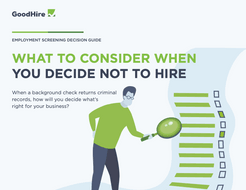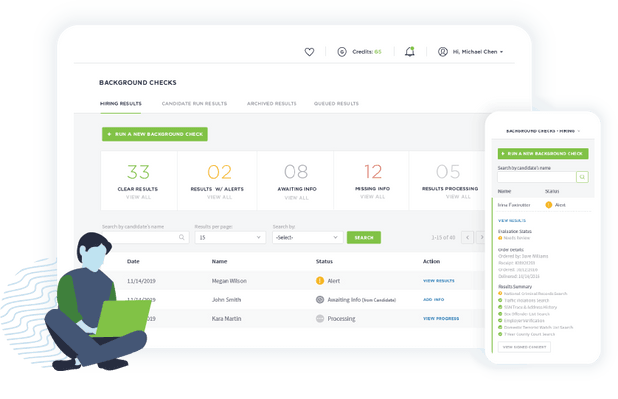Motor Vehicle Felonies: Reckless Driving, DUI, Suspended License & More
An MVR check may reveal serious driving-related crimes. Learn more about the different types of motor vehicle felonies.
Resourcesarticles
Lauren Woodyard
14 min read
In the realm of pre-employment background checks, criminal offenses such as driving under the influence (DUI) are among those often flagged for employer review and consideration. This guide covers the implications of DUls during an employer’s hiring process, including the appearance of DUIs on background checks and the duration they may stay on a candidate’s record. There are also legal regulations employers should consider when a candidate has a DUI criminal record, and we’ll discuss how these may affect hiring decisions.
A DUI charge is a criminal offense that indicates an individual has been accused or prosecuted for operating a vehicle under the influence of alcohol or drugs. In some jurisdictions, this is also referred to as DWI (driving while intoxicated)—a term that has the same implications as a DUI. A conviction of these charges will typically emerge on either a criminal background check or driving record (MVR) check. There is no specific DUI background check.
Understanding the implications of a DUI on a background check is essential for employers. It not only has potential regulatory impacts depending on your industry, but it also informs on important aspects of a candidate’s history that can impact their suitability for certain roles. Depending on multiple factors such as your company policy, the severity and age of the conviction, and any potential remediation, employers should use discretion when evaluating the relevance of DUIs on a background check.
Yes, a DUI is likely to appear on a background check. How does a DUI show up on a background check? This information varies by state, as both criminal searches and driving record checks may disclose DUI convictions. Additionally, it may depend on which searches an employer chooses to conduct.
The presence of a DUI on a background check may be substantial due to the nature of the offense—a DUI is a conviction that could indicate risky behavior. This information may be helpful for employers to assess the suitability of a candidate, especially for roles where driving or operating machinery is involved. Additionally, legal regulations may impact your hiring decision. For example, requirements for a commercial driver’s license (CDL) may include a driving record without a DUI charge.
Candidates may wonder, “Will a DUI show up on an employment background check?” and the answer depends on several factors. For roles where driving is a critical part of the job responsibilities, employers may choose to conduct screenings that will include this information. Understanding the implications of a DUI on a background check on hiring decisions and how it may show up based on search types and public records is paramount for an employer. This understanding aids in the formulation of fair, yet safe hiring decisions.
In addition to employment, other types of records—such as those for insurance—may report DUI convictions. Insurers may need to be aware of DUI convictions to correctly assess the risk profile of clients.

There are two common questions asked by candidates: “How long does a DUI stay on your driving record?” and “How long does a DUI stay on your criminal record?” The answer to both questions depends on the jurisdiction and the type of record in question.
In the context of a DUI criminal record, the reporting duration varies with each state’s laws. Certain states may limit reporting to seven or ten years, but in some cases, DUI convictions may be reported indefinitely.
In regards to a DUI conviction on a driving record, it again depends on the jurisdiction and severity of the offense. A DUI could remain on a driving record for a few years or indefinitely. This variable length of time makes it crucial for employers to understand the state-specific regulations in relation to DUI convictions. The table below shows example lengths for how long the record will be on a criminal history or driving record several states:
| State | Criminal Record Length | Driving Record Length | Points |
|---|---|---|---|
| Arizona | Indefinitely* | 5-10 years, depending on the severity of the offense | 8 points |
| California | Indefinitely* | 10 years | 2 points |
| Maryland | Indefinitely* | 3 years | 12 points |
| New Jersey | Does not appear on criminal record, considered a traffic offense | Minimum of 10 years | N/A |
| Ohio | Indefinitely* | 2 years | 6 points |
It’s worth noting that DUI charges are often flagged and evaluated during pre-employment screenings. While DUI convictions can hold significant weight in the hiring process, Equal Employment Opportunity Commission (EEOC) guidance suggests organizations should also consider factors such as the nature of the offense, the job’s requirements, and the candidate’s remediation efforts to make balanced hiring decisions.
A frequently asked question by both employers and candidates is “Will a DUI fail a background check,” and the answer isn’t as simple as a yes or no. While a DUI may trigger an alert on a background check, it does not necessarily translate into “failing” the check. A mistake many employers make is to equate a “clean” background check with passing and, conversely, an alert to failing. This is not the case.
Alerts on background checks are simply flags that require employer review. Specifically, a DUI on a background check is a signal calling for your attention and consideration as an employer.
Employers may consider evaluating the implications of the DUI conviction, including a misdemeanor DUI, against several factors. These factors may include your company policy, the nature of the job vacancy, and the context of the DUI offense itself. So, can you pass a background check with a misdemeanor DUI? That will depend on the employer’s policy and individual assessment of the candidate’s history.
The key takeaway for employers is to not consider each DUI alert as a definite red flag but rather as a point to review, considering multiple other factors to ensure a fair and contextual recruitment process.
A DUI background check may be essential for comprehensive insights about a candidate, especially when the position requires driving duties or the handling of corporate vehicles. It can also be significant even in non-driving roles, as it may reveal a pattern of risk-taking behavior or lack of judgment that could affect job performance. Understanding the role and potential implications of DUI convictions in the hiring process is a responsibility that you bear as an employer.
The idea of a DUI background check can also create concern among candidates. As employers, it’s vital to keep in mind the sensitive nature of these details and handle all personal information with discretion and confidentiality. A transparent hiring policy that articulates the potential influence of a DUI charge on a hiring decision can also go a long way in creating a trust-based professional environment.
Thus, a thorough and knowledgeable approach toward DUI background checks during hiring is crucial. By considering the scope and impact of DUIs, along with other relevant personal and professional factors of a candidate, you can make well-informed, fair, and prudent hiring decisions. It’s not just about conducting a DUI background check, but how you interpret and respond to the findings that ultimately affect your hiring decisions.
When conducting a DUI background check, employers should be aware of the various legal ramifications tied to DUI or DWI convictions. A conviction of this nature impacts not only potential employment but extends into several aspects of life. It can impede a candidate’s ability to secure housing, significantly affect insurance premiums, and bring forth other significant legal consequences. However, when we talk about employment, it is critical to remember that laws and regulations govern the use of background checks and drug tests to screen for past DUI or DWI convictions.
One pertinent law that regulates background checks is the federal Fair Credit Reporting Act (FCRA), which obligates employers to disclose your intent to conduct a background check and then obtain, in writing, the candidate’s consent before moving forward with the screening. The FCRA also requires employers to follow the adverse action process if they decide against hiring a candidate based on the results of a background screening.
EEOC guidance also stresses the importance of treating candidates equally and fairly. The guidance suggests that an employer should not reject a candidate based solely on past arrests or criminal convictions unless there are state or federal regulations forbidding individuals with a criminal history from holding the job, or the offense is relevant to job requirements. This guidance helps companies know how DUIs and other criminal records should factor into the hiring process, underlining the importance of lawful, fair hiring practices.
Also noteworthy is the Department of Transportation’s Drug & Alcohol Clearinghouse. Organizations covered by the FMCSA’s Drug and Alcohol Testing Program, which includes drivers holding Commercial Driver’s Licenses (CDLs), must include a background check that searches this database as part of their pre-employment screening process. This database validates whether the driver has any alcohol or drug-related violations, including DUIs. The inclusion of drug testing in the hiring process assists in maintaining workplace safety and compliance with industry regulations.
Understanding and complying with these legal requirements when there is a DUI on a background check is important. Employers can ensure not just an informed decision-making process but also avoid potential legal consequences.

Not always. DUIs generally show up on either a criminal background check or driving record check. However, the time period for which a DUI stays on your record varies depending on your jurisdiction and the specifics of the offense.
A DUI may be considered a noteworthy record for review on an employment background check, but it does not necessarily signal an immediate disqualification of the candidate. Many factors are taken into consideration, such as the nature of the job, the severity and age of the offense, and the candidate’s overall qualifications and job fitness.
The ability to remove a DUI from your record depends on several factors, including the specific laws of the state in which the conviction occurred. How to remove a DUI from a DMV record will vary by state. Some states allow for the expungement of certain convictions under specific circumstances. It’s best to consult with a legal professional for advice tailored to the specific situation.
A DUI conviction on a driving record can impact insurability, increase insurance premiums, limit employment opportunities, especially for jobs that require driving, and also signal potential risky behavior to employers.
No, the legal consequences of a DUI, including the length of time it remains on a driving record, and how it shows up on a background check vary from state to state. Some states report DUIs on a criminal background check, while others report such offenses on an MVR report.
The duration a DUI conviction stays visible on a background check depends on the laws of each state, with some state and federal laws limiting the reporting to seven years, while others may report indefinitely.
Understanding and navigating the complexities of DUI convictions and their impact on background checks is crucial for employers to make fair and informed hiring decisions. A DUI on a background check doesn’t spell an instant dismissal of a candidate, but instead flags an area that requires thorough employer review.
Conducting background checks using a professional screening provider, like GoodHire, can streamline the process while supporting compliance. GoodHire offers 100+ screening options, including criminal background checks and MVR checks, for employers looking to screen for a DUI criminal record. Our built-in workflows save time, while our customizable packages help employers make fair, informed hiring decisions based on their business needs.

The resources provided here are for educational purposes only and do not constitute legal advice. We advise you to consult your own counsel if you have legal questions related to your specific practices and compliance with applicable laws.
Follow Me
As GoodHire’s Content Marketing Manager, Lauren develops resources to educate on employment screening best practices and compliance. She also writes about GoodHire’s platform and company news.
An MVR check may reveal serious driving-related crimes. Learn more about the different types of motor vehicle felonies.
Verifying the status of a drivers license through an MVR check helps you assess a candidate’s legal eligibility to operate a vehicle.